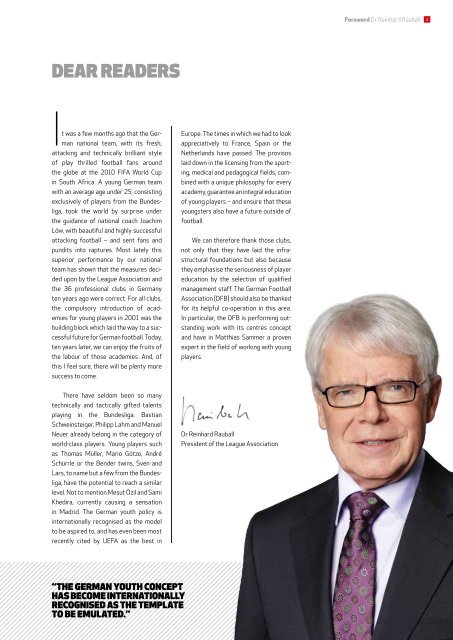10 Years Of German Academy Training.pdf
- No tags were found...
Create successful ePaper yourself
Turn your PDF publications into a flip-book with our unique Google optimized e-Paper software.
Foreword Dr Reinhard Rauball<br />
1<br />
Dear Readers<br />
It was a few months ago that the <strong>German</strong><br />
national team, with its fresh,<br />
attacking and technically brilliant style<br />
of play thrilled football fans around<br />
the globe at the 20<strong>10</strong> FIFA World Cup<br />
in South Africa. A young <strong>German</strong> team<br />
with an average age under 25, consisting<br />
exclusively of players from the Bundesliga,<br />
took the world by surprise under<br />
the guidance of national coach Joachim<br />
Löw, with beauti ful and highly successful<br />
attacking football – and sent fans and<br />
pundits into raptures. Most lately this<br />
superior performance by our national<br />
team has shown that the measures decided<br />
upon by the League Association and<br />
the 36 professional clubs in <strong>German</strong>y<br />
ten years ago were correct. For all clubs,<br />
the compulsory intro duction of academies<br />
for young players in 2001 was the<br />
building block which laid the way to a successful<br />
future for <strong>German</strong> football. Today,<br />
ten years later, we can enjoy the fruits of<br />
the labour of those academies. And, of<br />
this I feel sure, there will be plenty more<br />
success to come.<br />
Europe. The times in which we had to look<br />
appreciatively to France, Spain or the<br />
Netherlands have passed. The provisos<br />
laid down in the licensing from the sporting,<br />
medical and pedagogical fields, combined<br />
with a unique philosophy for every<br />
academy, guarantee an integral education<br />
of young players – and ensure that these<br />
youngsters also have a future outside of<br />
football.<br />
We can therefore thank those clubs,<br />
not only that they have laid the infrastructural<br />
foundations but also because<br />
they emphasise the seriousness of player<br />
education by the selection of qualified<br />
management staff. The <strong>German</strong> Football<br />
Association (DFB) should also be thanked<br />
for its helpful co-operation in this area.<br />
In particular, the DFB is performing outstanding<br />
work with its centres concept<br />
and have in Matthias Sammer a proven<br />
expert in the field of working with young<br />
players.<br />
There have seldom been so many<br />
technically and tactically gifted talents<br />
playing in the Bundesliga. Bastian<br />
Schwein steiger, Philipp Lahm and Manuel<br />
Neuer already belong in the category of<br />
world-class players. Young players such<br />
as Thomas Müller, Mario Götze, André<br />
Schürrle or the Bender twins, Sven and<br />
Lars, to name but a few from the Bundesliga,<br />
have the potential to reach a similar<br />
level. Not to mention Mesut Özil and Sami<br />
Khedira, currently causing a sensation<br />
in Madrid. The <strong>German</strong> youth policy is<br />
internationally recognised as the model<br />
to be aspired to, and has even been most<br />
recently cited by UEFA as the best in<br />
Dr Reinhard Rauball<br />
President of the League Association<br />
“The <strong>German</strong> youth concept<br />
has become internationally<br />
recognised as the template<br />
to be emulated.”




